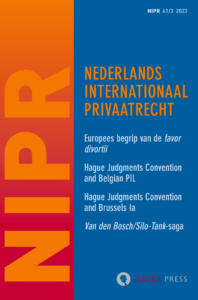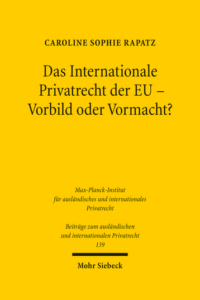Views
HCCH Revised Draft Explanatory Report (version of December 2018) on the Judgments Convention is available on the HCCH website
A revised Draft Explanatory Report (version of December 2018) on the HCCH Draft Convention on the Recognition and Enforcement of Foreign Judgments in Civil or Commercial Matters is available in both English and French on the Hague Conference website.
In my opinion, particularly complex topics in this Draft Explanatory Report include intellectual property (IP) rights (in particular, Art. 5(3) of the draft Convention– there are several provisions dealing with IP rights in addition to this Article) and the relationship of the draft Convention with other international instruments (Art. 24 of the Draft Convention). Some of the text is in square brackets, which means that such text has tentatively been inserted due perhaps to a lack of consensus at the Special Commission meetings, and thus a final decision will be taken at the Diplomatic Session scheduled for the summer 2019.
With regard to intellectual property rights, the draft Convention distinguishes between IP rights that require to be granted or registered (such as patents, registered trademarks, registered industrial designs and granted plant breeders’ rights) and those that do not require grant or registration (i.e. copyrights and related rights, unregistered trademarks, and unregistered industrial designs – this is a closed list for these specific rights). See paragraph 238 of the Draft Explanatory Report.
The draft Convention’s approach to IP rights, which is based on the territoriality principle, is set out very clearly in paragraph 235 of the Draft Explanatory Report. In particular, the draft Convention reflects a compromise according to which the State of Origin of the judgment will coincide with the lex loci protectionis i.e., the law of the State for which protection is sought, so as to avoid the application of foreign law to these rights (see also paragraph 236).
With respect to the relationship of the draft Convention with other international instruments, it is important to note that this draft Convention will cover, among many other things, non-exclusive choice of court agreements so as to give preference to the application of the HCCH Hague Convention of 30 June 2005 on Choice of Court Agreements to exclusive choice of court agreements. See paragraphs 220-225 and 410-430 of the Draft Explanatory Report.
The latest information about the Judgments Project is available here.
After the Romans: Private International Law Post Brexit
Written by Michael McParland, QC, 39 Essex Chambers, London
On 10 December 2018 the Ministry of Justice published a draft statutory instrument with the pithy title of “The Law Applicable to Contractual Obligations and Non-Contractual Obligations (Amendment etc) (EU Exit) Regulations 2018”. This indicates the current intended changes to retained EU private international law of obligations post Brexit. Read more
The renaissance of the Blocking Statute
Written by Markus Lieberknecht, Institute for Comparative Law, Conflict of Laws and International Business Law (Heidelberg)
Quite a literal “conflict of laws” has recently arisen when the EU reactivated its Blocking Statute in an attempt to deflect the effects of U.S. embargo provisions against Iran. As a result, European parties doing business with Iran are now confronted with a dilemma where compliance with either regime necessitates a breach of the other. This post explores some implications of the Blocking Statute from a private international law perspective. Read more
News
Dutch Journal of PIL (NIPR) – issue 2023/3
The latest issue of the Dutch Journal on Private International Law (NIPR) has been published
NIPR 2023 issue 3
EDITORIAL
M.J. de Rooij, Het leed van de circulerende Unieburger en het Europese begrip van de favor divortii [The suffering of the circulating Union citizen and the European concept of favor divortii] / p. 381-384
Workshop on ‘The Commission Proposal for a EU Regulation on Parenthood and the Creation of a European Certificate of Parenthood. Czech-German Perspectives’
Magdalena Pfeiffer (Charles University Prague) and Anatol Dutta (Ludwig-Maximilians-Universität München) will be hosting a workshop on the Proposal for a EU Regulation on Parenthood and the Creation of a European Certificate of Parenthood (discussed here) on 24 November 2023 in Prague.
Further information can be found on the flyer.
European Union Private International Law – Role Model or Hegemony?
 Caroline Sophie Rapatz, University of Kiel, has just published her German-language Habilitationsschrift on “European Union Private International Law – Role Model or Hegemony? Delimitations and Effects in Relation to National and International Conflict of Laws” (Das Internationale Privatrecht der EU – Vorbild oder Vormacht? Abgrenzungen und Wirkungen im Verhältnis zum nationalen und völkerrechtlichen Kollisionsrecht, Beiträge zum ausländischen und internationalen Privatrecht 139, Mohr Siebeck 2023 (XXVI, 693 p.) The book analyses the consequences of the Europeanisation of private international law (PIL) for the traditional regulatory levels of national and international (treaty and convention) conflict-of-laws rules and for the system of conflict-of-laws as a whole. The author has kindly provided has with the following summary of her insights:
Caroline Sophie Rapatz, University of Kiel, has just published her German-language Habilitationsschrift on “European Union Private International Law – Role Model or Hegemony? Delimitations and Effects in Relation to National and International Conflict of Laws” (Das Internationale Privatrecht der EU – Vorbild oder Vormacht? Abgrenzungen und Wirkungen im Verhältnis zum nationalen und völkerrechtlichen Kollisionsrecht, Beiträge zum ausländischen und internationalen Privatrecht 139, Mohr Siebeck 2023 (XXVI, 693 p.) The book analyses the consequences of the Europeanisation of private international law (PIL) for the traditional regulatory levels of national and international (treaty and convention) conflict-of-laws rules and for the system of conflict-of-laws as a whole. The author has kindly provided has with the following summary of her insights:


